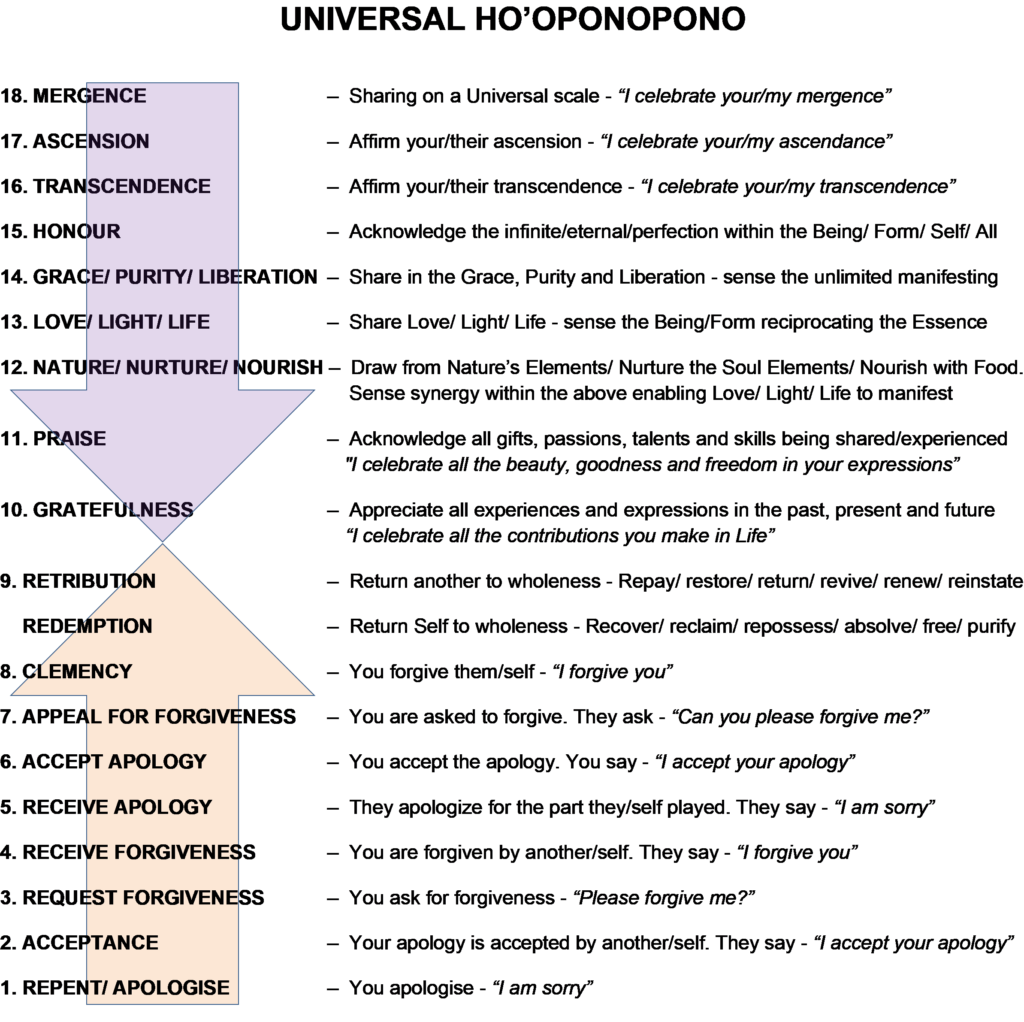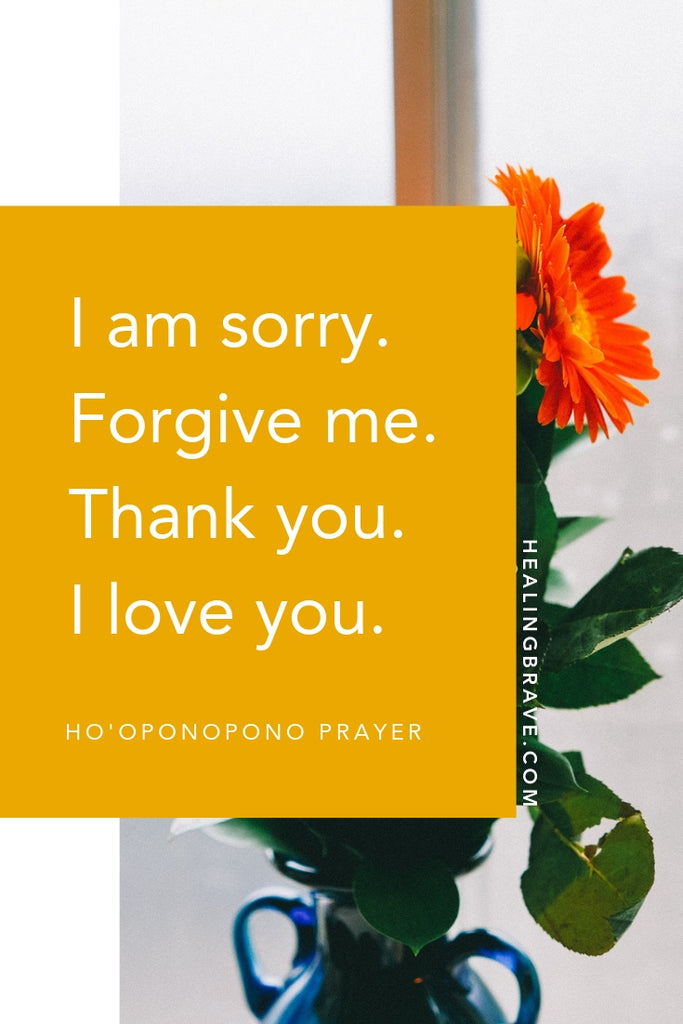In the practice of Ho’oponopono, acceptance plays a pivotal role in the healing and reconciliation process. By embracing acceptance, you allow yourself to let go of resistance and open up to forgiveness, both towards yourself and others. This article explores the profound impact of acceptance in Ho’oponopono, and how it can lead to profound transformation and inner peace.

Understanding Ho’oponopono
Ho’oponopono is a traditional Hawaiian practice that has been used for centuries as a way to heal relationships, release emotional baggage, and restore harmony and balance. The word “Ho’oponopono” can be translated as “to make right” or “to rectify an error.” At its core, Ho’oponopono is based on the belief that everything in the world is interconnected, and that by taking responsibility for ourselves and our actions, we can bring about healing and transformation.
Definition of Ho’oponopono
Ho’oponopono is a spiritual and healing practice that involves the process of reconciliation, forgiveness, and release. It is a way to address and resolve conflicts, both within ourselves and in our relationships with others. The practice of Ho’oponopono is centered around the idea that everything in our lives, including our emotions, experiences, and relationships, is a reflection of our internal state. By taking responsibility for our own thoughts and actions, and by seeking forgiveness and reconciliation, we can transform our lives and create a sense of peace and harmony.
Origins of Ho’oponopono
Ho’oponopono has its roots in ancient Hawaiian culture and has been passed down through generations as a way to resolve conflicts and promote healing. The practice was traditionally conducted by a trained mediator or elder, known as a “kahuna,” who would facilitate the process of reconciliation and forgiveness. Ho’oponopono was traditionally practiced within families or communities, but in recent years, it has gained popularity worldwide as a powerful tool for personal growth and healing.
Core principles of Ho’oponopono
The core principles of Ho’oponopono revolve around the concepts of acceptance, responsibility, and forgiveness. Acceptance is key in Ho’oponopono, as it requires acknowledging and taking responsibility for our own thoughts, emotions, and actions. By accepting and owning our part in any conflict or disharmony, we can begin the process of healing and transformation. Along with acceptance, Ho’oponopono emphasizes the importance of forgiveness, both for ourselves and for others. By releasing resentment and letting go of past grievances, we can create space for healing and move towards a state of harmony and peace.
Concept of Acceptance in Ho’oponopono
Importance of acceptance
Acceptance is a fundamental aspect of Ho’oponopono, as it allows us to move past resistance and open ourselves up to healing and transformation. Without acceptance, we may remain stuck in patterns of blame, guilt, or victimhood, preventing us from experiencing true resolution and growth. Acceptance is the starting point for any healing process, as it requires us to acknowledge and take responsibility for our thoughts, emotions, and actions.
Definition of acceptance in Ho’oponopono
In Ho’oponopono, acceptance is about acknowledging and embracing our own personal power and agency. It is about recognizing that we have the ability to choose our thoughts, reactions, and behaviors, and that we are responsible for the energy we bring into our experiences and relationships. Acceptance is not about condoning or approving of harmful actions or behaviors, but rather about taking ownership of our own reactions and responses to them.
How acceptance is practiced in Ho’oponopono
In Ho’oponopono, acceptance is practiced through a process of self-reflection, prayer, and meditation. It involves taking the time to examine our thoughts and beliefs, and to identify any negative or limiting patterns that may be causing disharmony or conflict in our lives. Acceptance also requires us to be willing to let go of our attachments to specific outcomes, and to surrender to the process of healing and transformation. Through self-acceptance and acceptance of others, we can create a space for forgiveness, healing, and reconciliation to occur.
Acceptance as a Healing Component
Acceptance as a key to healing
Acceptance plays a crucial role in the healing process, both on a physical and emotional level. When we accept and acknowledge our thoughts, emotions, and experiences without judgment or resistance, we create a space for healing and transformation to occur. Many illnesses and ailments are believed to be caused or exacerbated by emotional and mental imbalances. By accepting and releasing negative emotions and beliefs, we can support our body’s natural healing abilities and promote overall well-being.
Role of acceptance in releasing emotional baggage
Emotional baggage refers to unresolved emotions, traumas, or negative beliefs that we carry with us from past experiences. This emotional baggage can weigh us down and impact our relationships, health, and overall well-being. Acceptance is a powerful tool for releasing emotional baggage, as it allows us to acknowledge and release any attachments, judgments, or resentments we may be holding onto. By accepting and letting go of these emotional burdens, we can create space for healing and transformation to occur.
Acceptance as a catalyst for forgiveness
Forgiveness is closely tied to acceptance in Ho’oponopono. By accepting responsibility for our thoughts, emotions, and actions, we can embody a state of forgiveness towards ourselves and others. Acceptance allows us to let go of blame, anger, and resentment, and to cultivate compassion and understanding instead. Through the practice of acceptance and forgiveness, we can release the emotional charge associated with past hurts and wounds, and create an environment of healing and reconciliation.
Acceptance of Responsibility
Acknowledging personal responsibility
Accepting responsibility is a fundamental aspect of Ho’oponopono. It involves recognizing that we have the power to choose our thoughts, emotions, and actions, and that we are responsible for the energy we bring into our experiences and relationships. Taking personal responsibility allows us to move out of a victim mentality and empowers us to create positive change in our lives. It is a key step towards healing and transformation.
Overcoming victim mentality through acceptance
Victim mentality is a mindset characterized by blaming others or external circumstances for our own problems or challenges. Ho’oponopono encourages us to overcome victim mentality through acceptance. By accepting responsibility for our own thoughts and emotions, we shift from a state of powerlessness to one of empowerment. Acceptance enables us to recognize that we have the ability to choose our responses and reactions, and that we are not at the mercy of external forces.
Taking ownership of actions and consequences
Acceptance involves taking ownership of our actions and the consequences that arise from them. It requires us to examine our thoughts, emotions, and behaviors, and to be willing to acknowledge any harmful or negative patterns that may be contributing to conflicts or disharmony in our lives. By taking responsibility for our actions, we can actively work towards making amends, seeking forgiveness, and creating positive change in our relationships and experiences.
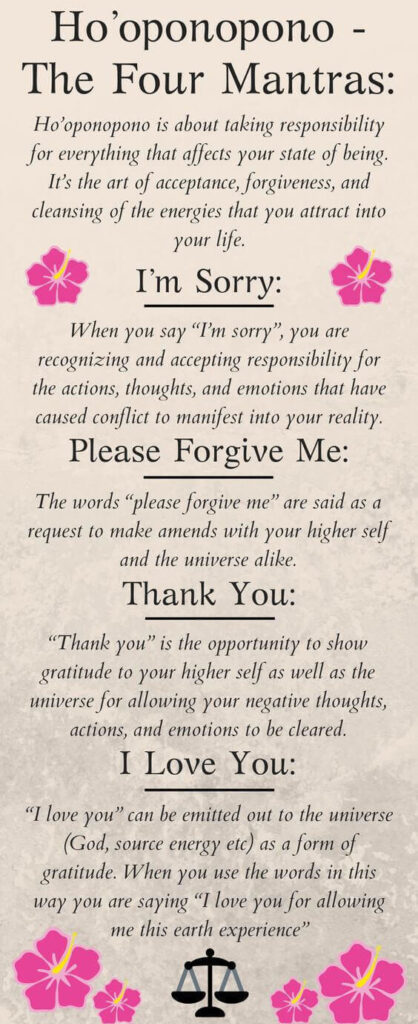
Acceptance of Self
Understanding self-acceptance
Self-acceptance is the practice of acknowledging and embracing all aspects of ourselves, including our strengths, weaknesses, and imperfections. It involves recognizing that we are worthy of love and compassion, regardless of our flaws or past mistakes. In Ho’oponopono, self-acceptance is essential for healing and transformation, as it allows us to release self-judgment and embrace our inherent divinity.
Loving and accepting oneself in Ho’oponopono
Ho’oponopono teaches us to love and accept ourselves unconditionally. It emphasizes the importance of self-care, self-compassion, and self-forgiveness. By loving and accepting ourselves, we can create a strong foundation for healing and growth. We can let go of negative self-talk, self-doubt, and self-sabotaging behaviors, and embrace a more loving and nurturing relationship with ourselves.
Embracing imperfections through self-acceptance
Self-acceptance also involves embracing our imperfections and recognizing that they are a natural part of being human. In Ho’oponopono, imperfections are seen as opportunities for growth and learning. By accepting and embracing our imperfections, we can cultivate self-compassion and resilience, and create a space for healing and transformation to occur.
Acceptance of Others
Importance of accepting others
Accepting others is essential in Ho’oponopono, as it promotes understanding, compassion, and harmony in our relationships and interactions. By accepting others as they are, without judgment or criticism, we create a space for healing and reconciliation to occur. Acceptance allows us to let go of expectations, attachments, and resentments, and to foster a sense of unity and connection with others.
Letting go of judgment and criticism
In Ho’oponopono, letting go of judgment and criticism is a key aspect of acceptance. By releasing judgments and preconceived notions about others, we open ourselves up to a deeper level of understanding and compassion. Judgment and criticism create barriers and disharmony in relationships, while acceptance fosters connection and healing.
Promoting understanding and compassion
Acceptance promotes understanding and compassion towards others. It allows us to see beyond surface-level differences and to recognize the common humanity that we all share. By accepting others as they are, we create a space for empathy and connection. Acceptance invites us to approach others with an open mind and an open heart, fostering healing and reconciliation in our relationships.
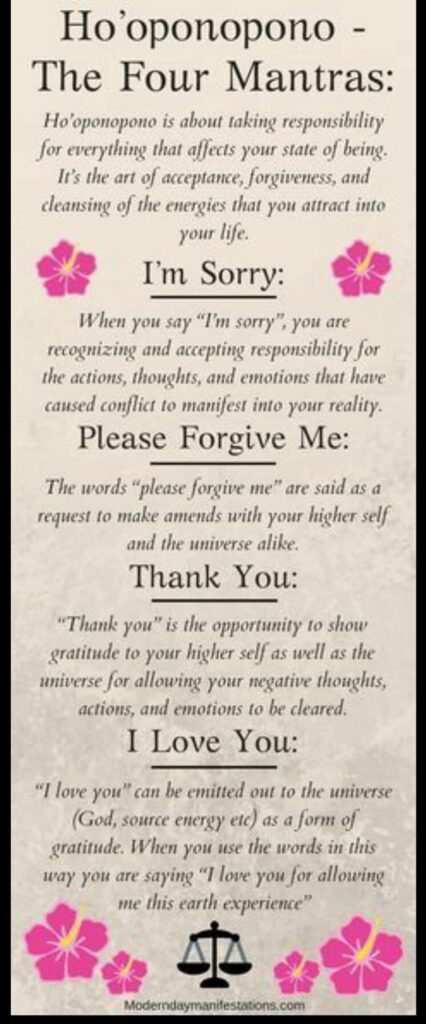
Acceptance in the Process of Healing Relationships
Releasing resentment through acceptance
Resentment is a common barrier in relationships, preventing healing and growth. In Ho’oponopono, acceptance plays a crucial role in releasing resentment. By acknowledging our own role in conflicts and taking responsibility for our thoughts and emotions, we can let go of resentments and create space for forgiveness and reconciliation. Acceptance allows us to move past blame and victimhood, and to foster a sense of understanding and compassion towards ourselves and others.
Repairing and restoring relationships through acceptance
Acceptance is a powerful tool for repairing and restoring relationships. By accepting responsibility for our own actions and reactions, we create an opportunity for open and honest communication. Acceptance allows us to address conflicts and misunderstandings from a place of compassion and understanding, and to actively work towards resolution and healing. Through acceptance, we can rebuild trust, strengthen bonds, and create a sense of harmony and peace in our relationships.
Creating harmony and peace through acceptance
Acceptance is the pathway to creating harmony and peace in our relationships. By accepting others as they are, without judgment or criticism, we create a space for understanding and connection. Acceptance allows us to release attachment to specific outcomes and to surrender to the process of healing and transformation. By embracing acceptance, we can cultivate deeper relationships, foster love and compassion, and create a sense of harmony and peace in our interactions with others.
Acceptance as a Connection to Divinity
Understanding the role of acceptance in spirituality
Acceptance plays a significant role in spirituality, as it enables us to connect with our higher self and the divine. In Ho’oponopono, acceptance is seen as a surrender to the divine will and a recognition of our own divinity. It involves letting go of the ego’s need for control and surrendering to a higher power. Acceptance allows us to align with the flow of life, trusting in the divine wisdom and guidance that is always available to us.
Strengthening the connection to the divine through acceptance
Acceptance strengthens our connection to the divine by opening us up to receive divine love, guidance, and support. By accepting and surrendering to the present moment, we create a space for the divine to work through us and guide us towards healing and transformation. Acceptance invites us to cultivate a deep sense of trust in the divine plan and to surrender our own agenda in favor of divine wisdom and guidance.
Surrendering and trusting in the power of acceptance
Surrender is a key aspect of acceptance in Ho’oponopono. It involves letting go of resistance and control, and trusting in the power of acceptance to bring about healing and transformation. Surrendering to the divine allows us to release attachment to specific outcomes and to trust in the process of life. By surrendering and trusting in the power of acceptance, we can open ourselves up to receive divine love, guidance, and support.
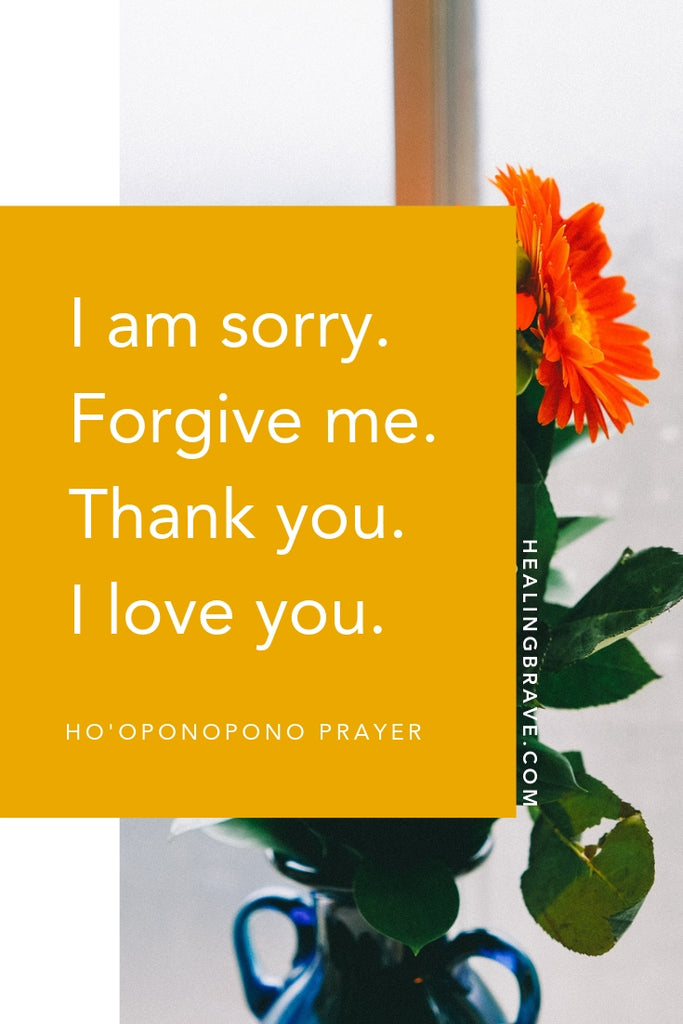
Challenges and Obstacles in Acceptance
Identifying resistance to acceptance
Resistance to acceptance can manifest in various ways and may present challenges in the practice of Ho’oponopono. Some common forms of resistance include denial, blame, and attachment to specific outcomes. It is important to be aware of these patterns and to recognize when resistance arises. By identifying resistance, we can bring it into our awareness and choose to let go of it, creating space for acceptance and healing to occur.
Overcoming fear and resistance
Fear is often a major obstacle to acceptance. We may fear acknowledging our own role in conflicts or taking responsibility for our actions. We may also fear letting go of resentments or attachments to specific outcomes. Overcoming fear and resistance requires courage and a willingness to step outside of our comfort zones. Through self-reflection, prayer, and meditation, we can begin to unravel the layers of fear and resistance and open ourselves up to acceptance and healing.
Developing a practice of acceptance
Developing a practice of acceptance requires dedication and commitment. It involves setting aside regular time for self-reflection, prayer, and meditation, and actively choosing acceptance in our thoughts, words, and actions. It is a process of continual learning and growth, as we navigate the challenges and obstacles that arise along the way. By developing a practice of acceptance, we can cultivate a mindset of healing, transformation, and peace.
Integrating Acceptance into Daily Life
Practical ways to incorporate acceptance in daily life
Incorporating acceptance into daily life is essential for embodying the principles of Ho’oponopono. Some practical ways to integrate acceptance include:
-
Cultivating mindfulness and self-awareness: By bringing our attention to the present moment and becoming aware of our thoughts, emotions, and reactions, we can cultivate a mindset of acceptance.
-
Practicing self-compassion: Being kind and loving towards ourselves, especially during challenging times, allows us to practice self-acceptance and create a foundation for healing and growth.
-
Letting go of attachments and expectations: By releasing attachment to specific outcomes and surrendering to the flow of life, we can open ourselves up to acceptance and trust in the divine plan.
-
Seeking forgiveness and reconciliation: Actively working towards forgiveness and reconciliation in our relationships promotes acceptance and creates space for healing and transformation.
Creating a mindset of acceptance
Creating a mindset of acceptance requires a shift in perspective and a willingness to see challenges and conflicts as opportunities for growth and learning. It involves letting go of judgment, blame, and resistance, and embracing a sense of openness and curiosity. By cultivating a mindset of acceptance, we can navigate life’s ups and downs with grace and resilience, and create a space for healing and transformation.
Benefits of embracing acceptance in all areas of life
Embracing acceptance in all areas of life brings about numerous benefits. By accepting ourselves and others, we cultivate deeper relationships, foster love and compassion, and create a sense of harmony and peace. Acceptance enables us to release emotional baggage, overcome fear and resistance, and promote healing and transformation. It strengthens our connection to the divine and allows us to trust in the power of acceptance to guide us towards a life of joy, fulfillment, and spiritual growth.
